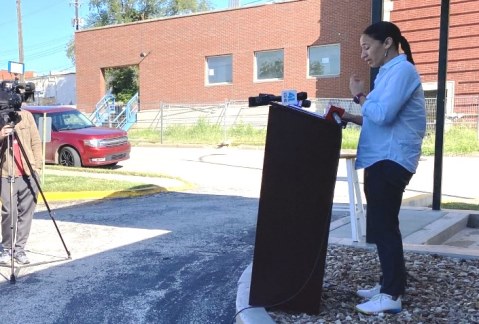
U.S. Rep. Sharice Davids, D-3rd Dist., said on Wednesday that she would support a new federal strategy to expand Medicaid in states including Kansas, where legislatures have repeatedly blocked it.
Rep. Davids called for the upcoming budget reconciliation package to both continue current expansion incentives and include a federal plan to expand Medicaid coverage. In a news conference in Kansas City, Kansas, Rep. Davids was joined by local advocates and health care professionals who have seen the need to expand Medicaid here.
Rep. Davids successfully fought to include increased financial incentives for Medicaid expansion in the American Rescue Plan, which became law in March of this year. Under those incentives, Medicaid expansion in Kansas would be completely paid for through the first two years, after which the federal government would continue to cover 90% of the cost.
Despite this, Kansas remains one of only 12 states that have chosen not to expand Medicaid, leaving 165,000 Kansans without access to affordable health care. Rep.Davids renewed her call for a new, federal strategy to step in and close the coverage gap in those 12 non-expansion states.
“During this time of uncertainty, no Kansan should have to worry about whether they will receive the care that they and their families need to stay healthy,” Rep. Davids said. “That’s why I’m fighting to continue the financial incentives that make it essentially free for Kansas to expand Medicaid, and to explore a federal option that would close the coverage gap even if the legislature continues to block expansion. Kansans have made their voices clear on this, and it’s time to act.”
“Medicaid expansion isn’t an abstract policy discussion. We currently have patients who refuse additional services because they can’t afford them—but with Medicaid, they could. It would have a huge impact on our patients and on our community as a whole,” said Patrick Sallee, president and CEO of Vibrant Health. “Plus, research shows that when people have insurance, they use it. I’m glad that Rep. Davids is exploring every avenue to make affordable health care available to more Kansans.”
“The majority of Kansans support Medicaid expansion but the issue has been bogged down by politics in Topeka,” said April Holman, executive director of Alliance for a Healthy Kansas. “The federal approach to closing the coverage gap will provide long-awaited relief to Kansas consumers, providers, and communities.”
One option to cover the more than 4 million Americans left vulnerable by states’ inaction is the Medicaid Saves Lives Act. This Davids-backed legislation would create a federal Medicaid-style program to extend coverage eligibility to all individuals under 138% of the federal poverty level, establishing a permanent solution for the failure of non-expansion states like Kansas to extend the program. As Congress already paid for Medicaid expansion in the Affordable Care Act, this federal Medicaid program should require no additional offsets, according to a spokesman.
Research confirms that Medicaid expansion increases access to care, improves financial security, and leads to better health outcomes, and failure to expand Medicaid disproportionately affects people of color, as 60% of people in the coverage gap are Black, Hispanic, Asian, or Pacific Islander. Additionally, a recent report found that Kansas could increase its economic output by $17 billion and add an estimated 23,000 new jobs if the state chose to expand Medicaid.
- Information from Rep. Davids’ office
